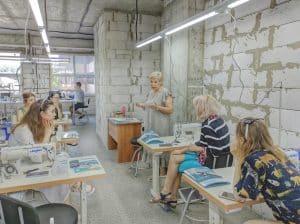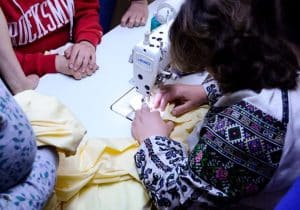Entrepreneurs face challenges when starting a small business. However, starting a new venture during wartime adds to an already stressful situation. For the women of The First Kyiv Sewing Co-operative, they overcame these start-up challenges to grow their businesses, offering new opportunities for women to improve their livelihoods through gaining new skills, employment and becoming part the co-operative movement.
Co-operatives are unique businesses because they bring people together and requires coordination, participation of all members, and effective management and organization.
These principles guide The First Kyiv Sewing Co-operative. This is their story.
What needed to be initially accomplished
The tasks facing the new co-operative were tangible and specific, including selecting the right equipment to meet production requirements to produce quality materials, coordinating the capabilities of the co-operative members, and incorporating additional services provided with the SEW Ukraine project.
One of the co-op founders with extensive experience in the garment industry, Tetiana Pryadko, recalls the challenges encountered during the formation process.
“In the early stages, the complexity lay in coordinating the joint product and the vision of the co-operators’ ideas’ development,” Tetiana said. “Auditing production capacities or a business plan for the newly created co-operative had to align with the project’s possibilities. This sometimes required adjusting plans or even starting everything from scratch.”
From conception to implementation
The First Kyiv Sewing Co-operative enhanced their production capabilities using automated and semi-automated equipment for quality product finishing. They print fabric rolls, embroider, and sewing accessories.

SEW Ukraine project participants receive training on tailoring techniques.
One of the co-operative’s founders, Daria Konovalova, said her family had experience in the garment industry. Her great-grandmother was a skilled tailor, and her grandmother was a designer who sewed. In addition, Daria’s mother made children’s clothes for the family.
“I recall sitting on my mother’s lap as a young child, observing closely as she worked on the sewing machine, imbibing safety techniques from an early age,” Daria said. “As I grew older, around five years old, they entrusted me with needles and threads, providing fabric scraps to experiment with sewing and knitting clothes for my dolls.”
Daria decided to switch careers and join the garment industry when she discovered the project and the possibilities it offered. She helped create the First Kyiv Sewing Co-operative.
The path yet untraveled, but achievements already evident
The results of the co-operative’s work and achievements at this stage are noteworthy. According to Anton Lisyutin, a sewing industry expert with the SEW Ukraine project, considerable progress has been made. After the co-operatives were formed, members went through training and attended workshops. The co-op members understood their projects’ development, outlined strategic and tactical goals, and set the development vector for each business. In one case, co-operative members wanted to develop a joint brand and product line to include underwear and sleepwear, including women’s panties and tops, men’s underpants and t-shirts, unisex t-shirts as well as women’s and men’s pajamas.
“The configuration of co-operative production sites complements production capacities according to the specificity of the produced products, allowing them to create high-quality products and compete with market leaders,” Anton said.
What further steps are required for the co-operative launch
Much more lies ahead for The First Kyiv Sewing Co-operative.

Participants train on sample materials.
Even after obtaining equipment and conducting repairs, questions arise about organizing work, hiring high-quality workers, and selecting highly qualified engineering and technical personnel – significant problems for the industry today.
“Additionally, the shortage of specialists in the country has caused competition and there’s also high migration due to military actions,” Tetiana said. “Also, active efforts are currently underway in The First Kyiv Sewing Co-operative to prepare for the production process.”
“Today, premises have been selected, projects have been developed, equipment has been obtained, and the selection of engineering and technical personnel is underway for the launch and the creation of product collections for future seasons,” says Olena Tovstokora, the co-operative’s chairperson and an internally displaced person.
This is just one success story of the SEW Ukraine project. In fact, there are hundreds of such stories: large and modest, collective, and individual, those who already work and earn, and those who are only preparing for their first serious step in the entrepreneurial sphere. But all of them are united by the desire for positive change and an independent position over their future and the fate of their loved ones.
The SEW Ukraine project has inspired many socio-economically vulnerable women to start their own business. For the Ukrainian economy, it is a chance to recover faster from the war.
About SEW Ukraine
Through the support of Global Affairs Canada, this project will support women’s economic empowerment and overall well-being. Opportunities in the garment industry are the step forward. The project will support women beneficiaries by giving access to employment, vocational training, workplace integration training, and ancillary services.
The project will support women with higher skills to establish new micro, small, and medium-sized enterprises (MSMEs). In addition, women who own or manage MSMEs (existing and start-ups) will engage in customized capacity-building support. The training includes business management, access to loans for increased competitiveness, and the formation of co-operatives to advance sustainable, profitable, and gender-equitable businesses.